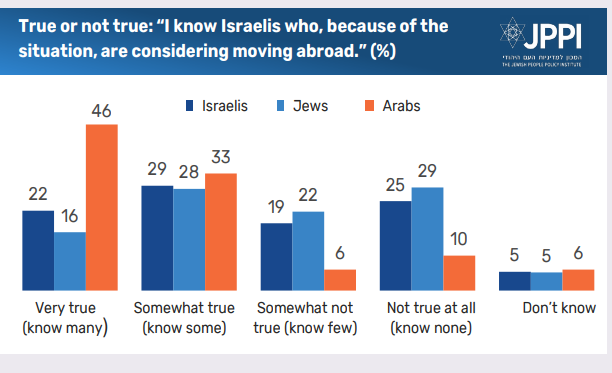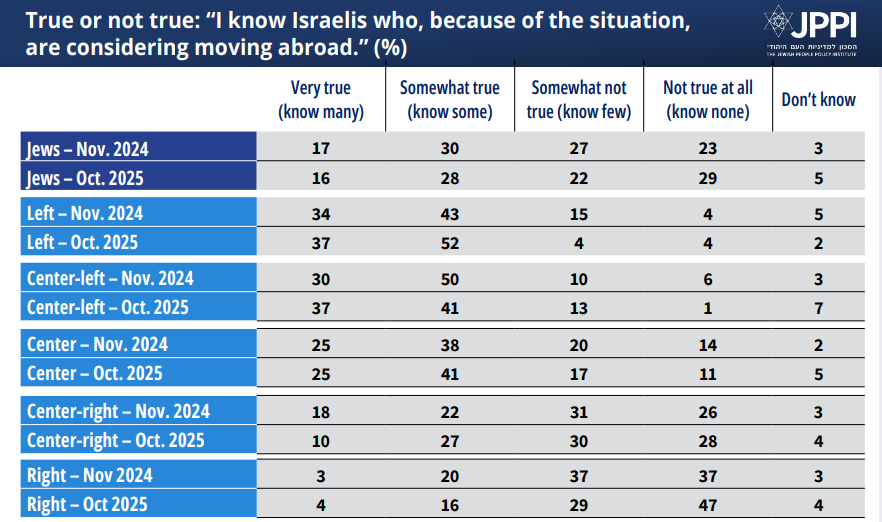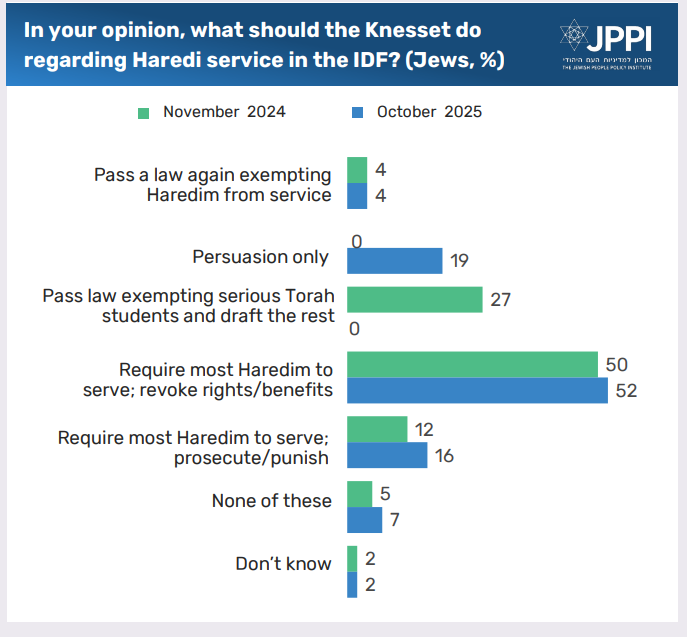This report addresses the war in Gaza, confidence in leadership and in victory, and Israel’s relations with key countries.
Additional Findings:
- Two years after the war began, one-third of Israelis feel mostly worried.
- After another year of war, the national mood has remained largely unchanged.
- Most Israelis agree that the war dragged on because it lacked clear and realistic objectives.
- The majority of Israelis believe the war was prolonged because the government did not make the right decisions quickly enough.
- Most do not agree that the war dragged on because the IDF senior command was not determined enough to win.
- There has been a decline in the share of Israelis who believe international pressure impeded Israel and prolonged the war.
- Most agree that the war is being prolonged due to the coalition’s political interests.
- Regarding future relations with the Palestinians: a third support expanding Israeli control, a third support separation, and a quarter support reaching a peace agreement.
- Israelis’ trust in key allies, France and the UK, has collapsed (trust in Germany has declined as well).
- A majority of Israelis support mandatory conscription for most draft-eligible ultra-Orthodox men and punitive measures for those who evade IDF service.
- Half of Israel’s National‑Religious Jews endorse requiring most ultra-Orthodox men to enlist and applying punitive measures to those who evade IDF service.
- About half of Israelis know other Israelis who are considering moving abroad.
- About a quarter of Israelis say that if they had the opportunity to emigrate, they would.
- Among Arab Israelis, a higher share say they would emigrate if they had the opportunity to do so.
- Over the past year, optimism about Israel’s future declined; half of Israelis are optimistic.
- There has been a sharp decline in Arab Israelis’ optimism about Israel’s future over the last year.
To download the PDF file, click here.
After the late‑September meeting between Prime Minister Benjamin Netanyahu and President Donald Trump, an American 20-point plan for a ceasefire and the release of the hostages was published. Netanyahu publicly stated that the proposal was acceptable to Israel. This survey was conducted prior to the meeting.
Confidence in Victory
This month, the share of Jewish Israelis who believe Israel is winning or has won the war remained stable; among Arab Israelis, there was a further uptick in the share who do not think Israel is winning. Over the past four months, the share of arab israelis who believe israel is winning rose sharply: from roughly a quarter of respondents to nearly half.
Feelings of victory are strongly shaped by political orientation: among respondents self-identifying as “left,” there is a significant lack of confidence regarding Israeli victory – almost half answered that they “do not at all feel” that Israel is winning; only a tiny minority (under 10%) say they are “completely certain” that Israel will win. As one moves rightward on the political spectrum, optimism rises – among those identifying as “right” and “center‑right” (most Jewish Israelis), a majority placed themselves at levels 4–5, meaning they feel mostly or fully confident that Israel is winning the war.
Confidence/Trust in the Political Leadership and the IDF
JPPI’s October Israeli Society Index survey found that the level of trust in the government among the Jewish public was similar to that recorded in August. Currently, about three in five Jewish Israelis report low trust in the government, while about two in five report high trust – one of the highest levels recorded over the past 18 months. Among Arab Israelis, trust is low: 83% report low trust, compared with 59% among Jews.
Trust levels in the IDF senior command are significantly higher than in the political leadership. Sixty-three percent of the general public expresses trust in the IDF senior command (15% very high + 48% somewhat high). Among Jewish Israelis, the figure is even higher, 69%. By contrast, a majority of Arab respondents (53%) say they do not trust the IDF senior command, and only 38% say they do. Relative to last month, the share of Arab Israelis reporting high trust in the IDF senior command rose (38% vs. 33%), and the share reporting low trust declined (53% vs. 61%).
Two Years into the War
The October 2025 JPPI Index survey finds that, two years into the war, a large share of Israelis – about a third – feel “mostly worried.” This is the most dominant feeling among the six options presented to respondents. Beyond this, more than four in ten Israelis (43%) feel “angry,” “sad,” or “despairing.” In contrast, about a quarter (26%) feel “optimistic” and “determined.”
Findings at the two‑year mark are quite similar to those measured a year ago and a year and a half ago. Feelings shaped during the first year of the war have remained largely unchanged. In broad strokes: those who were determined or optimistic a year ago remain so (25% then vs. 26% now); those who were despairing a year ago (14%) remain so today (15%). While conditions on the ground have not been static, with dramatic developments on several fronts, the overall emotional state of most Israelis is similar to a year ago.
As in previous iterations, the predominant feeling differs widely across groups. Among Jews the worry is the chief emotion, and among Arabs, it is sorrow. Among secular and traditional Israelis, worry predominates. Among religious and Haredi Israelis, optimism predominates. Among the small Christian subsample (results not statistically robust), anger is the foremost emotion. Among left-wing Jews, worry slightly prevails (33%), with nearly the same share selecting despair (31%).
Emotions also differ by political party affiliation. Likud supporters primarily report determination (42%). Yisrael Beiteinu supporters report worry (49%), as do supporters of parties headed by Gadi Eisenkot (49%), Yoaz Hendel (45%), and Naftali Bennett (42%). Among supporters of the Democrats (the left‑most party), the foremost feeling is also worry, but anger and despair are also prominent – more than half expressed one of these two (26% and 27%, respectively). Supporters of Otzma Yehudit resemble Likud supporters in feeling determined. Supporters of the religious and ultra-Orthodox parties (Religious Zionism, Shas, United Torah Judaism) express optimism at very high rates.
The Prolonged War
Opinions differ as to why the war has lasted two years. We asked about this in previous surveys (at the one-year and year-and-a-half marks), and again in the present survey. Just as responses to most options changed little over the past year, so too have public views on why the war continues. A majority of Jewish Israelis (55%) and half of Arab Israelis (48%) agree that “the war was prolonged because the tasks are complex and take a long time to complete.” By political camp, agreement with this statement is highest on the right, and significantly lower for the centrist and left-wing respondents.
A majority of Israelis (agree + somewhat agree) say the war was prolonged because it lacked clear and realistic goals that would allow it to end. This majority is driven by very high agreement in the center and left, and lower agreement on the right. Among Arab Israelis, agreement is higher – 72% vs. 60% among Jews.
The assertion that the war was prolonged because the IDF senior command lacked sufficient determination to secure a quick victory does not have majority support: 40% agree, and 54% disagree. Broken down by ideological orientation, the right is the only cohort in which a majority (agree + somewhat agree) accepts the claim; in the center‑right and all other cohorts, a majority disagree.
Large majorities of both Jews (76%) and Arabs (77%) agree (agree + somewhat agree) that the war was prolonged because the government did not make the right decisions quickly enough. Although agreement is lower on the right, a majority still agrees (64% of the right-wing cohort, and 76% of the center‑right) – both higher than a year ago (60% and 67%, respectively).
In recent months, international criticism of Israel has intensified due to the ongoing fighting in Gaza, with concern about the civilian humanitarian situation. Calls for sanctions and legal investigations are emblematic of declining international legitimacy. Large demonstrations against Israel were held, and incidents targeting Israelis and Jews were recorded. Most Israelis believe such international clamor has impeded Israel’s wartime progress and slowed fulfillment of its objectives; agreement with this contention is higher on the right, while there is no majority agreement among the center and left respondent cohorts.
Most Israelis do not agree with the claim – sometimes voiced by coalition members – that the war was prolonged because of constraints imposed by the legal system on the IDF. On the right, however, agreement is relatively high: 54% agree (down from 62% last year), and another 20% somewhat agree (down from 25% last year).
A majority (55%) agree that the war has been prolonged due to the coalition’s political interest in extending it. Among Arab Israelis, a large majority agrees (77%); among Jewish Israelis, a smaller majority (55%) agrees. As expected, among coalition party voters, an overwhelming majority disagrees: 88% of Likud voters, 87% of Religious Zionism voters, 84% of Shas voters, and 88% of United Torah Judaism voters. Across all opposition parties, a majority agrees or somewhat agrees.
There is no majority support for the claim that protests and pressure groups are prolonging the war by weakening the determination to win. Agreement is highest among right-wing respondets: 53% agree and another 29% somewhat agree. Among center‑right respondents, 33% agree and 20% somewhat agree.
Relations with the Palestinians
Following recognition of a Palestinian state by several countries in the past month, we repeated a question about Israelis’ preferred approach to a future settlement with the Palestinians. Roughly one-third (35%) of all Israelis think Israel should strengthen its control over the Palestinians, expand settlements, consider dismantling the Palestinian Authority, and possibly annex parts of Judea and Samaria (the West Bank). Another third (30%) think Israel should pursue full separation from the Palestinians, dismantle settlements outside the large blocs, and focus on maintaining the IDF’s freedom of action to prevent terror groups from growing. Another quarter (25%) believe Israel should strive for a peace agreement with moderate Palestinians and allow the establishment of a Palestinian state that lives in peace alongside Israel (a Gallup poll last month, with a differently phrased question, found a very similar share of Israelis supporting a two‑state solution – 27%).
Israel and the World
We asked Israelis how “friendly” certain key countries are toward Israel. The table below shows the share of respondents who think specific countries are friendly. Among the countries presented, Germany received the highest friendliness rating. Next came India, then the United Kingdom and France, and lastly China and Russia. There are differences between Jewish and Arab Israelis – Arab respondents generally attribute higher friendliness scores than their Jewish counterparts.
Against the backdrop of the UN General Assembly debates and recognition of a Palestinian state by several countries, most Jewish Israelis (and a minority of Arab Israelis) view France as “not friendly.” Last year, about four in ten Jews said so; this year, nearly two‑thirds (64%) do. Accordingly, whereas last year about a fifth viewed France as friendly, this year the share is closer to a tenth (12%). Among Arab Israelis, friendliness ratings for France also declined –a majority viewed it as friendly a year ago; this year, fewer than half (48%) do.
A similar picture appears for other European countries. Regarding the United Kingdom, the share of Jews who say the UK is not friendly more than doubled this year – from 18% in September 2024 to 42% now; about a third (37%) say the UK is neither friendly nor unfriendly. The share that thinks the UK is friendly roughly halved – from almost 40% last year to less than 20% (19%) this year. Among Arab Israelis, 60% say the UK is friendly – a majority, though down from 70% last year.
Germany remains the only European country most Israelis still view as friendly. Among Jews, nearly two‑thirds (64%) describe Germany as friendly. Even among those who self-identify as right‑wing – critical of France and Germany – almost half (46%) say Germany is friendly. Still, sentiment cooled compared to last year: among Jews, friendliness fell from 83% to 64%. The share who says Germany is unfriendly remains relatively low, under 10%.
Future in Israel
About half of Israelis (51%) know Israelis who, because of the situation, are considering moving abroad. Among Jews, the figure is 44%; among Arabs, 79%. Broken down by ideological orientation, the share who know such Israelis is higher on the left; as one moves rightward, fewer say they know other Israelis considering leaving, and more say they know none.
There has been little change since November 2024 among Jews who know other Israelis considering emigration, and there has been a slight rise in those who know none. Broken down by ideological orientation, the shifts diverge: in the left-wing cohort, there has been an increase in those who know many or at least some (89% in Oct 2025 vs. 77% in Nov 2024). On the right, the opposite is true: fewer report knowing such Israelis, and significantly more say they know none (from 37% to 47%).
Israel’s Future
Half of Israelis (50%) are optimistic about Israel’s future (very + somewhat), and nearly as many (49%) are pessimistic (very + somewhat). Optimism is higher among Jews than among Arabs. About 77% of the center‑left cohort and a majority of the centrist group (61%) are pessimistic. By contrast, 64% of the center‑right and 85% of the right-wing cohorts are optimistic. Broken down by religiosity, most secular Israelis (60%) are pessimistic, while most other groups are optimistic.
Ultra-Orthodox (Haredi) Conscription
Ahead of the start of the Knesset’s winter session and the ultra‑Orthodox parties’ demand of passing a Haredi draft exemption law as a condition for continued coalition support, most Jewish Israelis (68%) believe the Knesset should mandate that most Haredim serve in the IDF. Most who take this view also believe that punitive measures (revocation of certain rights and government subsidies) should be taken against those who evade service; a smaller share think draft evaders should be prosecuted and punished. About a fifth (19%) say that only persuasion should be used; 4% say pass a law that exempts Haredim from IDF service as was the case “until recently.” Majorities of left, center, and center‑right respondents support requiring most Haredim to serve or have them face revocation of rights/benefits. Two in five in the right-wing cohort (where most coalition supporters are) also support this, while a third (34%) favor persuasion only. Just 5% of the right support a blanket exemption law.
Broken down by religiosity, majorities (or at least half) of all groups except the Haredim say most Haredim should be required to serve and that rights/benefits should be revoked for draft evaders. Among National‑Religious Jews, 50% support punitive measures, and a quarter (23%) support persuasion only.
This year’s answer choices were changed slightly from those offered in November 2024. Instead of the option “Pass a law exempting Haredim who seriously study Torah and draft the rest,” we added “Persuasion only.” Despite this change, Jewish respondents’ answers were similar to last year. There was a rise in those who say that most Haredim should be required to serve (up two percentage points for those who also support revoking rights/benefits; up four points for those who support prosecution/punishment).
Due to the holiday period, JPPI’s October survey was conducted between September 25 and 28, 2025. The survey was administered to 774 Israeli respondents, Jews and Arabs. Data was collected by the Madad.com (568 Jewish sector respondents in an online survey), and Afkar Research (206 Arab sector respondents, about half online and half by phone). The data was weighted and analyzed according to voting patterns and religiosity to represent the adult population of Israel. The JPPI Israeli Society Index is compiled by Shmuel Rosner and Noah Slepkov. Prof. David Steinberg serves as statistical consultant.


























